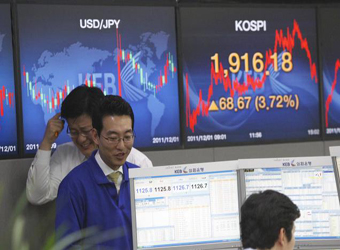Asian stocks exchanges turned positive Friday as currency swings captured attention with the yuan midpoint fixed at its lowest against the dollar since May 2008 and Japan stocks up slightly on recent yen weakness.
The People Bank of China set the daily yuan mid-point fix at 6.9508 versus its last close at 6.9478. The yuan fetched 6.9466 per dollar as of 3:10 pm HK/SIN.
Chinese policymakers have been rushing to curb capital outflows and spending foreign exchange reserve to support the yuan, after the Fed raised rates and the dollar hit 14-year highs. China’s foreign exchange reserves fell more-than-expected to a six-year low of $3.05 trillion in November.
Mainland Chinese shares were higher, the Shanghai composite finished up 0.2 percent or 6.35 points at 3,124.03 and the Shenzhen composite ended up 0.949 percent or 18.73 points at 1,991.63.
Japan’s benchmark Nikkei 225 closed up 0.66 percent or 127.36 points at 19,401.15, boosted by a weaker yen. A weaker yen usually supports exporters as it can increase earnings that are repatriated, particularly on sales made in dollars, and makes pricing more competitive abroad.
Nintendo plummeted 4.24 percent to 26,405 yen per share, and down more than 10.8 percent this week. Investors were cautious ahead of the “Super Mario Run” smartphone game release on Apple’s iOS. This is the Japanese gaming giant’s first iPhone mobile game launch, and has raised concern among investors about its profitability.
Australia’s ASX 200 finished down 0.1 percent or 5.677 points at 5,532.9, weighed by heavy losses in the all-ordinaries gold sub-index, which plunged 6.71 percent.
The major gold miners were in the red. Newcrest Mining was off 4.72 percent to 16.75 Australian dollars per share, Evolution Mining plunged 8.26 percent to A$1.61 and Alacer Gold was down 1.3 percent at A$1.905.
In South Korea, the Kospi closed up 0.27 percent or 5.59 points at 2.042.24, while Hong Kong’s Hang Seng fell 0.11 percent by mid-afternoon.
Shares of animal vaccine makers were driven higher after South Korea’s agriculture ministry raised the bird flu alert status to the highest level, as the disease spread nationwide.
Cheil Bio was up 6.79 percent to 5,110 Korean won, while Choong Ang Vaccine rose 1.2 percent to 25,300 won.
On Thursday, major U.S. indexes bounced back from an initial slip on the Federal Reserve’s decision on Wednesday to raise interest rates for the first time this year. Positive economic data also helped give markets a leg up.
The Dow Jones industrial average continued its post-U.S. election rally that has put it on track to hit the 20,000-points mark, finished up 0.3 percent, or 59.71 points, at 19,852.24. The S&P 500 closed up 0.39 percent, or 8.75 points, at 2,262.03, and the Nasdaq composite ended 0.37 percent, or 20.18 points, at 5,456.85.
On the currency front, the dollar was sharply higher against a basket of currencies, at 102.98 as of 3:15 pm HK/SIN, and up more than 2 percent this week.
The yen weakened further against the dollar, fetching 118.13, compared to levels around 115 prior to the Fed decision. The Australian dollar traded at $0.7357.
Treasury yields have also spiked sharply, with the benchmark 10-year note yield hovering around 2.593 percent, while the two-year note yield traded around 1.276 percent.
In commodity markets, spot gold was trading at $1,130.66 an ounce, near a 11-month low.
“Gold was a casualty of the U.S. dollar rally [on Thursday] and gold miners are likely to be under pressure again today,” said Ric Spooner, chief market analyst at CMC Markets, in a note on Friday.
“Oil, on the other hand is holding up relatively well. Next year’s production cuts are likely to see the market supported with bargain hunters active in quality energy stocks on minor dips,” Spooner added.
During Asian trade, oil prices shrugged off the stronger greenback to trade higher. U.S. crude oil futures were up 0.57 percent at $51.20 a barrel, while Brent futures rose 0.48 percent at $54.28. A stronger dollar would generally weigh on demand for the dollar-denominated crude.
In other news, the Hong Kong-listed China Huishan Dairy suspended trading on Friday after a report from U.S.-based short-seller Muddy Waters released a report questioning the firm’s profits. The report accused China Huisan Dairy of inflating spending on its cattle firms to raise capital expenditure figures, Reuters reported.
Source: CNBC


